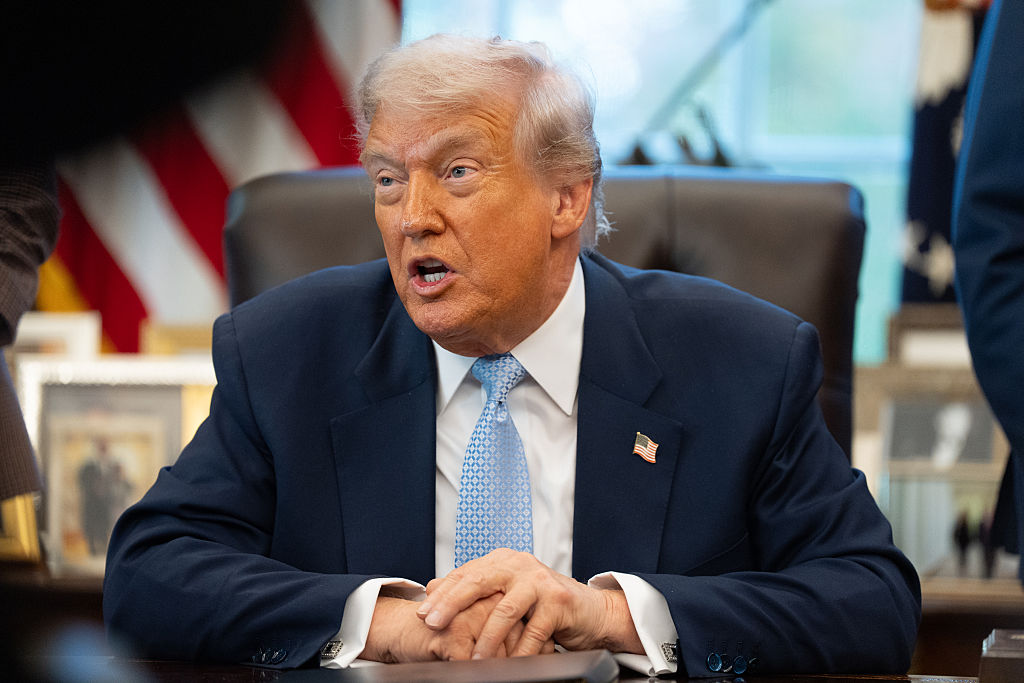On Venezuela, Trump Should Take the Money and Run
If this is in fact just a “pressure campaign,” let’s take the concessions and call it.

As I wrote some months ago, if you don’t like this administration’s policies, wait 15 minutes. In the sort of off-the-cuff statement that leads policy, President Donald Trump told a press gaggle Sunday that the U.S. might be back to talks with Venezuela’s President Nicolas Maduro: “We may be having some discussions with Maduro, and we’ll see how that turns out, but they would like to talk.” This confirmed an anonymous official’s comment in a November 14 New York Times piece, which asserted that talks were (the Times’ words) “not entirely dead.” There appear to be various proposals about Maduro voluntarily leaving power floating around, although it’s not clear what would replace him, or how. (It’s also not clear how seriously to take these stories; the leaks are coming from the American side, where there are a variety of plausible motives for getting momentum behind the Maduro voluntary retirement/exile narrative.)
This all is not to say that negotiations and the diplomatic offramp are unambiguously back on. There’s still a lack of clarity about what’s going on down there. The USS Gerald Ford joined the Iwo Jima Amphibious Ready Group and miscellaneous other assets in the Caribbean. This confab even has a silly name, which shows that the Pentagon is taking it very seriously—“Operation Southern Spear.” The administration is expected to put the “Cartel de los Soles” on the State Department’s list of designated terrorist organizations, which is the traditional American prelude to bombing someone, especially if the “organization” in question isn’t really an organization as such. The president has reportedly signed off on the CIA conducting covert operations in Venezuela, which is a charming concession to the official fiction that the CIA doesn’t just do whatever it wants in Latin America anyway.
We have been assured that this all is just a pressure campaign, that it’s “regime collapse,” which is very different from “regime change,” that in fact there’s a very well-tuned and reactive program, and it’s just very secret. This would be more convincing if the administration didn’t leak like the Titanic around 2am. If there were a plan, we’d know about it. (Indeed, the administration would probably tell us about it! It’s not as if the White House is shy about PR when it has a grand plan to show off.)
Subscribe Today
Get daily emails in your inbox
But this is only a sideways criticism. If the White House doesn’t really know what it’s going to do, that means a military adventure isn’t a foregone conclusion. If the U.S. cuts a deal with Maduro, good; it is a good thing for reason to prevail at the White House. There are real, material interests for the U.S. in Venezuela, and it would be a great coup if these could be met short of rolling the dice on regional stability. If the administration insists that this was “the plan” the whole time, so be it, although one can’t help but wonder whether the whole thing could have been accomplished without the plentiful, flagrant lying to the American people and the dubiously legal footwork that has attended it.
Refocusing American attention on the Western Hemisphere is the flavor of the week, and a welcome one at that. (How many times have you seen military assets leaving CENTCOM, let alone to serve SOUTHCOM?) But the reorientation of American foreign policy should not be solely a matter of changing theaters; it should account for the failures of that foreign policy’s recent history, for the fact that resorting to force is always a gamble, that the U.S. in fact has only a limited ability to dictate conditions outside its own borders, that sometimes a power vacuum is worse than a corrupt state. (This is not to mention the damaging effects of interventionism on a notionally republican polity.) The problem hasn’t just been that American foreign policy has focused on faraway lands that do not much pertain to American interests. It has been that the policy itself has been based on shoddy analysis and badly executed. We can do better.
There is in fact a point at which a “pressure campaign” must stop if it is to remain a pressure campaign rather than a war. The success of further escalation, say by strikes on Venezuelan territory or obviously American “covert” operations, is not a foregone conclusion; the failure of such measures will tend to demand more and more force, and will not necessarily make Caracas more liable to negotiate. Trump has a chance, a chance of finite scope and duration, to prove that he is in fact finding a new way for American foreign policy—that rational statesmanship, not reliance on force backed by blind luck, is a viable course. The saber has been rattled; let it remain sheathed. Let’s liven up those channels that are “not entirely dead.” Let’s have the deal.